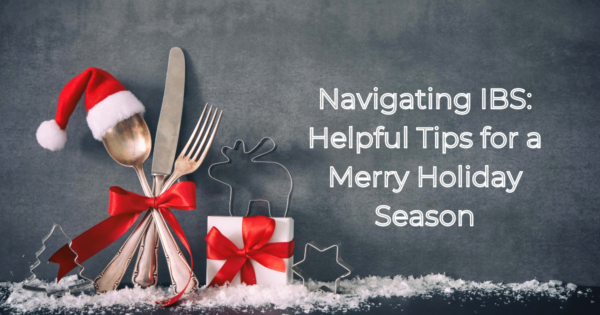
As the festive season is upon us, for those with Irritable Bowel Syndrome (IBS), the excitement of Christmas can sometimes be accompanied by anxiety about how to manage symptoms. Festive foods, irregular schedules, and social gatherings can pose challenges for individuals with sensitive digestive systems. However, with a bit of planning and some mindful choices and practices, it’s possible to enjoy the holiday season whilst staying on top of IBS. In this article, we’ll explore some practical tips and strategies on how to manage IBS during the festive season.
Plan Ahead
Take control of your holiday meals by planning ahead. If you’re visiting friends’ or family and you already know your IBS dietary triggers, communicate your dietary needs to the host in advance. There’s no shame in needing a little dietary modification, and most people are able to accommodate a range of dietary needs these days. You could give the chef some tips specifically related to dietary modifications for IBS, such as using maple syrup on carrots instead of honey, and using garlic oil instead of garlic for flavour.
Perhaps you could consider contributing a dish for the big day that aligns with your dietary requirements, which will give you the reassurance that there’s at least one safe option for you to enjoy.
Mindful Choices
Some foods are associated with exacerbating IBS symptoms. Common triggers include high-fat foods, spicy dishes, alcohol, caffeine and carbonated beverages. If fat is a trigger for you, then consider steaming some of the veggies or try using an air fryer for those roast potatoes.
If you’re on the low FODMAP diet, or if you have a sensitivity to some FODMAPs then fill up on low FODMAP foods first which are generally safer for individuals managing IBS. Roasted meat, potatoes, carrots and parsnips are usually good options to go for, and side vegetables like spinach, courgette, green beans and swede are also easy on the digestive tract.
Need some inspo about what to cook? Monash have you covered with this low FODMAP Christmas ebook!
Mindful Practices
Slow down! Eating too quickly can lead to overeating and may contribute to IBS symptoms. Chew your food well and if you can, take a break between courses, giving your body time to digest and signal when you’re full.
Additionally, be mindful of stress which is a common trigger for IBS. Incorporate stress-reducing activities into your routine, such as deep breathing and meditation. Getting outside for a short walk can really help your digestive system as well as calm the nervous system too.
Moderation
While it’s tempting to indulge in the festive feasts, practising moderation can help prevent digestive distress. Rather than saving space for that big lunch or dinner, aim to still have your normal breakfast in the morning (e.g. nutty granola with chia seeds and flax), and when it comes to the main event, avoid piling onto the plate, instead saving some leftovers for later.
Stay Hydrated
Another important one. Ensure you stay hydrated throughout the day. If you’re having alcohol which is a known gut irritant (it can make the gut more leaky), you could try to have a soft drink next to your alcoholic one as a reminder. Make your water interesting by adding a slice of fruit or some berries, or consider trying a gut-loving kombucha!
Prioritise Sleep
Lack of sleep can impact digestive function and potentially worsen IBS symptoms. See our blog post on this topic for more information. If you can try to maintain your normal routine to keep that circadian rhythm balanced, then your gut microbes will thank you. Plus a tired you may mean you’re likely to crave more of those starchy foods the next day which may contribute to or worsen your bloating.
A thoughtful and proactive approach can make all the difference to IBS. By embracing practical strategies such as planning ahead, making mindful food choices, and incorporating stress-reducing practices, individuals with IBS can navigate the festive period with confidence.
Remember, each person’s journey with IBS is unique, and understanding your body’s triggers and tolerances is key. If you haven’t yet identified your triggers and tolerances, there’s still time to book an appointment with one of the team, and we are offering 20% off new appointments by using the code WINTER20 at the time of booking.
Here’s to a happy and healthy season – may your festive moments be filled with warmth, understanding, and a mindful balance that allows you to cherish the season without compromise.
